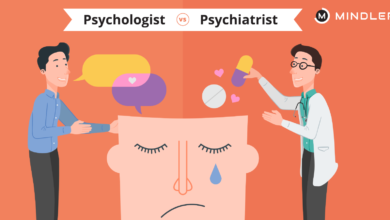Learn All About Difference Between a Therapist and a Psychiatrist

In today’s fast-paced world, mental health awareness has become increasingly important. Many individuals are seeking professional help to navigate their emotional and psychological challenges. Two commonly used terms in the mental health field are “therapist” and “psychiatrist.” While both play crucial roles in helping individuals improve their mental well-being, they differ in their training, approaches, and the services they offer. This article’ll delve into the difference between therapist and psychiatrist, helping you make informed decisions about your mental health care.
Introduction
In the realm of mental health care, understanding the roles of therapists and psychiatrists is essential. While they share a common goal of helping individuals improve their mental health, their methods and areas of expertise differ significantly.
Education and Training
One of the primary distinctions between therapists and psychiatrists lies in their educational backgrounds and training.
Therapists:
- Therapists typically hold master’s or doctoral degrees in fields like psychology, counseling, or social work.
- Their training focuses on providing psychotherapy or talk therapy.
Psychiatrists:
- Psychiatrists are medical doctors (MDs) or doctors of osteopathic medicine (DOs) who have completed medical school.
- They undergo specialized training in psychiatry during their medical residency.
- This training enables them to diagnose mental health disorders and prescribe medication.
Scope of Practice
The scope of practice is another crucial factor to consider when differentiating between therapists and psychiatrists.
Therapists:
- Therapists primarily provide non-medical, talk-based therapies.
- They help clients explore their feelings, thoughts, and behaviors to promote mental well-being.
Psychiatrists:
- Psychiatrists have a broader scope of practice, as they can diagnose mental health disorders.
- They can prescribe medication when necessary, in addition to providing therapy.
Treatment Approaches
The therapeutic approaches therapists and psychiatrists employ vary, depending on their areas of expertise.
Therapists:
- Therapists use a variety of therapeutic approaches, such as cognitive-behavioral therapy (CBT), psychoanalytic therapy, and humanistic therapy.
- Their focus is on helping clients develop coping strategies and insights into their emotional challenges.
Psychiatrists:
- They can prescribe and adjust medications to address specific mental health issues.
Medication Prescribing
One of the most significant distinctions is the ability to prescribe medication.
Therapists:
- Therapists do not have prescribing privileges.
- They rely solely on psychotherapy techniques.
Psychiatrists:
- Psychiatrists can prescribe medication when necessary.
- Medication can be a valuable component of treatment for certain mental health conditions.
Types of Issues Addressed
The range of mental health issues that therapists and psychiatrists can address varies.
Therapists:
- Therapists are well-equipped to handle a wide range of emotional and psychological issues.
- They are especially effective in treating issues related to daily life stress, relationships, and personal growth.
Psychiatrists:
- Psychiatrists often specialize in treating severe mental illnesses like schizophrenia, bipolar disorder, and major depression.
- They are essential for cases where medication management is crucial.
Setting and Environment
The setting in which therapy takes place can vary and impact the overall experience.
Therapists:
- Therapy sessions with therapists often occur in private offices or clinics.
Psychiatrists:
- Psychiatrists may provide therapy in clinical settings but also work in hospitals and other medical facilities.
- The focus may be more on medical evaluation in their offices.
Duration of Treatment
The length of treatment with therapists and psychiatrists can differ significantly.
Therapists:
- Therapists often engage in long-term therapy, with sessions occurring weekly or biweekly.
- The duration of therapy can range from a few months to several years.
Psychiatrists:
- Depending on the client’s needs, psychiatrists may provide both short-term and long-term treatment.
- The focus can be on stabilizing acute symptoms or providing ongoing support.
Collaboration with Other Professionals
Collaboration with other healthcare professionals can be essential in some cases.
Therapists:
- Therapists may collaborate with psychiatrists or other specialists if medication is required.
- They often work in tandem with other mental health providers.
Psychiatrists:
- Psychiatrists can collaborate with therapists, psychologists, and other healthcare professionals to ensure comprehensive care.
- This interdisciplinary approach can be valuable in complex cases.
Cost of Services
The cost of therapy and psychiatric services can vary, and insurance coverage may also play a role.
Therapists:
- Therapy sessions with therapists are often more affordable than psychiatric evaluations.
- Insurance plans typically cover therapy to some extent.
Psychiatrists:
- Psychiatric evaluations and medication management may be more expensive.
- Insurance coverage for psychiatric services can vary widely.
Choosing Between a Therapist and a Psychiatrist
The decision between seeing a therapist or a psychiatrist depends on individual needs and circumstances.
Myths and Misconceptions
There are several common myths and misconceptions about therapists and psychiatrists that need clarification. Read more…
Real-Life Experiences
Hearing about real-life experiences can provide insight into the benefits of therapy and psychiatric care.
Conclusion
In conclusion, difference between therapist and psychiatrist play unique but complementary roles in the field of mental health care. Understanding the differences in their education, scope of practice, and treatment approaches can help individuals make informed decisions about their mental well-being.
Frequently Asked Questions (FAQs)
- Is it necessary to see both a therapist and a psychiatrist?
The necessity to see both professionals depends on your specific mental health needs. In some cases, one may suffice, while in others, a combination of therapy and medication management may be beneficial. - How do I choose between a therapist and a psychiatrist?
Consider your symptoms, the severity of your condition, and your treatment preferences. Consulting with a mental health provider can help you make an informed decision. - Are therapists and psychiatrists confidential?
Yes, both therapists and psychiatrists are bound by confidentiality rules. Your personal information and discussions are kept private, with some exceptions for safety concerns. - Can I switch between a therapist and a psychiatrist if needed?
Yes, you can switch between professionals if your needs change or evolve during the course of treatment. Open communication with your providers is key. - What should I expect during my first therapy or psychiatric appointment?
During your first appointment, you can expect to discuss your concerns, goals, and treatment options. Your provider will work with you to create a tailored treatment plan.




